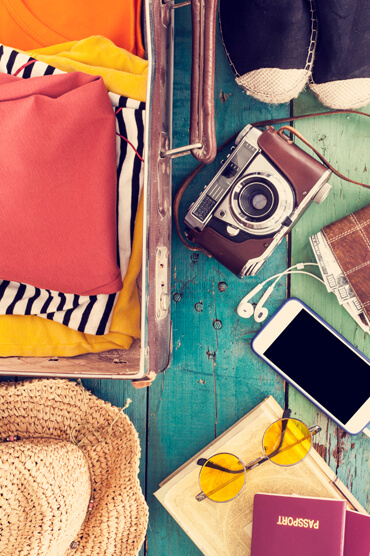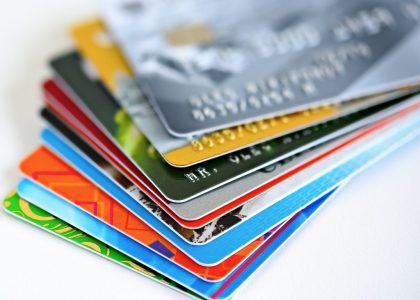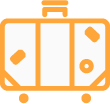It’s the ultimate travel worry. You use your ATM in a remote part of the world and it eats your card, or a week later your account has been emptied due to additional transaction fees or poor exchange rates. All you have left in your pocket is small change; and there’s still the hotel bill to pay, and the bus fare to the airport. You can always panic, but its best to just take the time to prepare for worst-case scenarios before you leave home. Here’s some of our recommendations to help you keep your money flowing, and to keep it safe .
Cash
 The golden rule for your travel money is never keep all your eggs in one basket. If something gets lost or stolen you lose everything. Carry a useful amount of cash for each day hidden somewhere discreet on your person. Keep the rest in a secure location, like your hotel safe. Here are some handy tips for how to handle cash when you’re on the road:
The golden rule for your travel money is never keep all your eggs in one basket. If something gets lost or stolen you lose everything. Carry a useful amount of cash for each day hidden somewhere discreet on your person. Keep the rest in a secure location, like your hotel safe. Here are some handy tips for how to handle cash when you’re on the road:
- US dollars, British pounds and Euros are the easiest currencies to change, particularly in the developing world. Keep enough aside to support yourself for a few days as an emergency fund. Keep this in smaller-denomination bills, so you don’t have change everything at once at a disadvantageous rate.
- Changing money on the street is a great way to get ripped off – especially if you’re unfamiliar with the local currency. Always be sure to exchange foreign currency with a recognised trader, such as a bank or exchange bureau.
- You will always find better rates on exchanging foreign currency if you plan in advance, rather than changing it at the airport or abroad. There are many ways to buy foreign currency (online, offline, from banks or from private retailers), so find out your options beforehand.
- Ignore boasts of ‘no commission’ as this won’t always mean you get more bang for your buck. Do your research and find out exactly how much money you’ll get from the exchange – the more you get, the better the deal.
- There are some destinations where cash is the only way as they have yet to plug into the global ATM network, so the only money available is what you bring in. Research this in advance, there are great travel advice forums, or speak directly to your travel agent.
Cards
 Using cards on the road can have advantages, and it’s smart to use a mix of cash and card so that you have a backup if one goes missing.
Using cards on the road can have advantages, and it’s smart to use a mix of cash and card so that you have a backup if one goes missing.
Credit cards come in handy for making reservations, for larger purchases and are an excellent back up in case of emergencies.
Debit cards allow you to access your money the same way as you do at home immediately, without the whopper credit card bill to come home to after holiday. If your ATM debit card is linked to a major global credit card company, you’ll have no problem making withdrawals in hundreds of countries worldwide.
Many banks and credit card companies now offer prepaid cards, which can be charged as much as you like and used like a debit card. They’re great for sticking to your travel budget, are available in single or multiple currencies and often have the same benefits as debit cards, such as emergency cash and card replacement services. Just be sure to check how easy it is to get any remaining balance back from your card when you return. As an added bonus, most cards offer favourable exchange rates you can lock in before you travel, and you can recharge the card online, by phone or SMS. Also many cards are linked to benefits packages while travelling, such as airport lounge access or discounts with hotels. Make sure you look into these packages and utilise them on your travels.
If you’re using plastic, here are a few simple rules that every traveller should follow:
- Make sure your credit, debit or prepaid card is accepted in the country you plan to visit.
- Call your bank and tell them where you are going and when, so they don’t block your card the first time you use it on your travels. Many banks allow you to do this online.
- Never let your card out of your sight. Most credit card scams require time alone with your card – if you don’t see an electronic-point-of-sale machine, play it safe and pay with cash from an ATM.
- Check the layout of the keypad on the ATM. Loads of travellers lose their cards by entering the right pattern but the wrong numbers on a foreign ATM keypad.
- Always carry back-up cash or travellers cheques. ATMs rely on electricity supply and a phone signal, two things that are notoriously unreliable in the developing world.
- Bring multiple cards if you can, and store your extra card locked away in your room’s safe with your other valuables, in case of emergencies.
- Be aware of bank charges – banks charge a fee for every withdrawal, and most offer poor exchange rates for credit and debit cards.
- If you have the option, pay in the local currency on your debit or credit card when abroad, as your bank’s rates will be better than the retailer’s.
- Revolut are quickly becoming big players in the travel industry. Revolut is a global money app that includes a pre-paid debit card, currency exchange, and peer to peer payments. Revolut currently charges no fees for the majority of its services, and uses interbank rates for its currency exchange . The London based startup was founded by Nikolay Storonsky and Vlad Yatsenko and currently supports spending and ATM withdrawals in 90 currencies and sending in 23 currencies directly from the mobile app.
Wiring money/Transfers

International money transfer is improving rapidly with the emergence of a number of innovative new services such as CurrencyFair. These services offer easy to use platforms across multiple devices and often at far more competitive, and speedier rates than banks.

CurrencyFair have an excellent blog post comparing many of the international money transfer options if you wish to find out more: https://www.currencyfair.com/blog/money-transfer-companies-compared/
Western Union and Moneygram have agents all over the world where you can receive a wire transfer from home, but you pay a premium for the service – sometimes as much as 30% of the transfer amount. Just pray you have an understanding relative if you rely on this option!
The best way to keep your money flowing, and keep it safe, is to prepare your budget, your spending and your cash flow in advance of your holiday, or move abroad.

